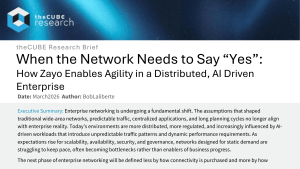Salesforce’s strategy of harmonizing data across its ecosystem and leveraging AI agents marks a transformational shift in how enterprises will manage and utilize data. By creating a unified data model, Salesforce is enabling organizations to deploy AI at scale with far-reaching implications for customer interaction, process automation, and overall operational efficiency. Companies that embrace Salesforce’s model will be well-positioned to lead in the AI-driven future, benefiting from faster, more accurate insights and enhanced business performance.
Summary
At Dreamforce 2024, Salesforce’s AI and platform technical leader, Muralidhar Krishnaprasad (MK), outlined a strategic vision centered on harmonizing data across Salesforce’s ecosystem and leveraging AI-driven agents to revolutionize business processes. The initiative aims to unify disparate data sources, streamline operations, and facilitate tighter integration with partner systems through Salesforce’s Data Cloud. With this foundational data harmonization, AI agents will be empowered to drive automated, contextually aware interactions that enhance customer relationships and deliver actionable insights at scale.
This research note explores the key insights shared by MK, the importance of harmonized data for AI success, and the strategic implications for enterprises aiming to unlock the full potential of AI.
Key Insights from theCUBE @ Dreamforce:
1. Harmonized Data: The Foundation of AI Success
Salesforce is prioritizing the harmonization of data to ensure its AI agents can operate effectively across the enterprise. According to MK, a canonical reference model will allow Salesforce to reduce data silos and guarantee identity resolution, which ensures consistent, clean, and unified data for AI applications. This harmonized approach is critical for AI agents to deliver accurate, meaningful insights without being hindered by fragmented data environment.
2. Salesforce Data Cloud as the Central Hub
The Salesforce Data Cloud is at the heart of this vision. It acts as the central hub that integrates customer and partner data across multiple platforms, enabling real-time data processing and analysis. By creating a single source of truth, Salesforce allows AI agents to access rich datasets, which in turn fuels more informed and timely business decisions. The Data Cloud facilitates not only data management but also seamless integration with external partners, expanding the potential for AI-driven innovation.
3. Unified Identity Resolution for Enhanced Personalization
A persistent challenge in large-scale AI deployment is identity resolution—the ability to recognize and unify customer data across multiple systems. Salesforce’s AI models are designed to resolve these discrepancies, ensuring that AI agents interact with the correct data points, providing personalized and relevant customer experiences. This approach is particularly valuable in industries that rely heavily on customer intimacy, such as retail, financial services, and healthcare.
4. AI Agents to Transform Business Interactions
MK emphasized that Salesforce’s AI agents, which leverage harmonized data, are designed to provide intelligent, context-aware interactions across various business functions. These AI-driven agents can anticipate customer needs, streamline workflows, and improve customer engagement by acting proactively. The long-term goal is for these agents to become indispensable tools that assist businesses in responding rapidly to changing customer demands, optimizing operational efficiency.
Implications for Enterprises
1. Data as a Strategic Asset
For enterprises aiming to leverage AI, data harmonization is no longer optional. Companies must ensure that all their customer, partner, and operational data is synchronized, clean, and available for real-time AI processing. Salesforce’s leadership in harmonizing data presents a clear framework that organizations can adopt to streamline their AI initiatives.
2. Seamless Integration with Partner Systems
By focusing on the interoperability of its platform with external systems, Salesforce is future-proofing its AI and data offerings. This opens up opportunities for enterprises to enhance their data sources by integrating with partners, enriching the data available for AI-driven applications, and extending their reach into new markets.
3. AI Personalization and Automation at Scale
Salesforce’s unified approach to identity resolution and AI agent deployment will give enterprises a competitive edge, particularly in sectors where personalization is crucial. Companies that adopt these AI-driven technologies will be able to deliver highly customized experiences at scale, increasing customer loyalty and boosting revenue growth.
Strategic Recommendations
1. Invest in Data Harmonization Solutions
Enterprises should prioritize investments in data harmonization technologies like Salesforce’s Data Cloud. The ability to centralize, unify, and synchronize data will be critical for maximizing AI’s potential in decision-making and automation.
2. Expand Data Partnerships
Organizations should seek out strategic partnerships that enable the expansion of their data sources. Integrating external data systems with Salesforce’s ecosystem will further enhance the effectiveness of AI agents, resulting in more comprehensive insights and improved decision-making.
3. Prepare for AI Agent Integration
Enterprises must prepare for the integration of AI agents into customer-facing and back-office roles. Early adoption of Salesforce’s AI agent technologies could lead to significant operational efficiencies and a strong competitive advantage in delivering exceptional customer experiences.


